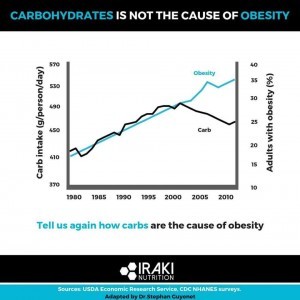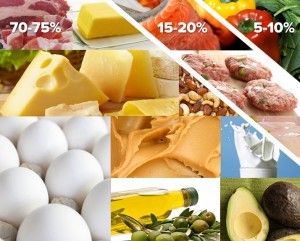Alright it's time for a pop quiz. And today the question is 'What's the best way nutritionally to achieve a weight loss goal?'Now depending who you talk to the answer will vary. Answers may include: keto low fat intermittent fasting cleanse or detox whole foods raw foods vegetarian vegan IIFYM (aka if it fits your macros) flexible dietingAnd there's more than this to add to the list.Get's kind of confusing doesn't it? Paralysis by analysis comes to mind.Recently a colleague shared a graph on his social media. And it caught my attention and became the foundation for this post.Here's the graph:[caption id="attachment_5560" align="aligncenter" width="300"] Carbohydrate intake and percentage of adults with obesity over time.Here's what the graph shows:One the left vertical axis is carb intake in grams/person/day. The range is from the low 400s to the mid 500s per day.On the right vertical axis is the percentage of adults with obesity.On the horizontal axis is time in years from around 1980 to 2010.Two lines are plotted on the graph. In black we can see the consumption of carbs. And a black line represents the percentage of individuals with obesity.A few observations from this graph include: Carb intake increased steadily from 1980 to 2000. From 2000 to 2010 carb intake has been on the decline. Obesity rates have increased steadily from 1980-2010 The graph is based on a certain population i.e. obese individuals. We don't know anything about the quality of the carbohydrates consumed.This now creates an interesting conversation.First of all, we understand carb intake was reduced. Was caloric intake reduced as well? Or were carb calories replaced with additional protein or fat?I haven't dug into the reference for this graph so can't comment on what else changed with the population. Has nutritional quality decreased? Have activity levels dropped off? Have sleep...
Should You Be Ketogenic?
- Chris Collins
- Fitness
- 1653 Hits
- 0 Comments
-
Are you familiar with the term ketogenic? In the last few years this has become an increasingly popular nutrition approach used by some for health, weight loss and other reasons. Below is a quick overview on whether this approach will work for you depending on what your goals are.[caption id="attachment_5228" align="aligncenter" width="300"] A ketogenic diet. 5% carbohydrate. 20% protein. 75 % fat.First of all, we should probably define what we mean by a ketogenic diet. This is a nutritional approach that uses a high fat, low fat mix of macros that was initially developed to treat children with epilepsy. Basically when the body experiences a fast glucose levels drops. A particular hormone HSL, hormone sensitive lipase, increases and helps breakdown fat.What Is the Breakdown of Macros?As for the specific mix of carbs, fats and proteins, we're talking about 5% carbs, 75% fat and 20% protein. If these number don't mean too much to you consider that in the literature a VLCD (very low carbohydrate diet) is 40% of calories from carbohydrate. This is 8X the carbs that you would eat on a ketogenic diet. Another way of looking at it is that athletes may sometimes get as much as 70% of the calories from carbohydrates.So this is a vastly different approach from the various other 'low carb' approaches or performance nutrition recommendations.How Much Protein?In terms of protein, we sometimes hear more is better. And the more meathead you are the more you beat your chest and reach for another steak or chicken breast. On a ketogenic diet it's important to keep protein to the 20% threshold because anymore can lead to gluconeogenesis. This is the metabolic process where protein is broken down into its amino acids and then reassembled to make new glucose.When we're talking about eating 75% of our calories from...
Never Would I Ever
- Chris Collins
- Fitness
- 1639 Hits
- 0 Comments
-
Last week I was watching the Bachelorette with my wife. And yes, I surrendered my man card before settling in on the couch to watch.On this particular episode the girl (I'll pretend I can't remember her name so as to retain some of my manliness) and her dates appeared on the show Ellen. They played a game call 'Never Have I Ever' and the guys were asked a number of questions to which they would answer 'I Have' or "Never Have'. And I thought this would be fun topic for a blog post from a coach's perspective.What are the things a coach would never say yes to? In no particular order here are the things a coach would never say.1. Ketogenic Diets Are a Bad Idea - We work with individuals that want to look, feel or play better. And to achieve each of these goals involves fitness training, and more specifically, resistance training. Carbohydrates are the fuel that allow us to train intensely. Restricting them in the diet impairs our ability to train as intensely as possible, delays our recovery and makes the training feel harder than it really is i.e. perceived exertion.But for those that don't have performance as their number one goal, ketogenic diets may be advantageous. There are instances when a reduction in carbohydrate consumption can helping with weight loss and with the treatment of some diseases.So while we typically advocate our athletes to eat a minimum of 40% of their calories as carbohydrate, and our look and feel better clients to eat a minimum or 30%, there may be times where a ketogenic diet could be a good thing for the right individual.2. Never Take Supplements - If you've worked with us for any period of time you know our definition of supplements which is 'in...

